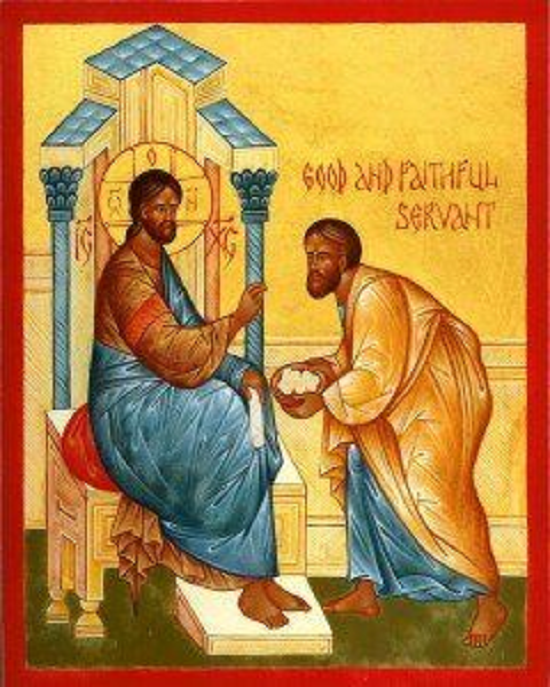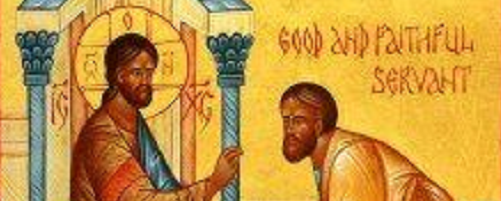The Day of Reckoning
Thirty-Third Sunday Scripture Readings

We’re fast approaching the close of our liturgical year. Next Sunday is the last Sunday of Ordinary Time. Our liturgy will celebrate Christ as ruler of all creation as we conclude this year’s journey through the Gospel of Matthew and, once again, we commence our four-week preparation for the celebration of the coming of the Messiah. The readings for the next two weeks focus our attention on what in Greek is known as the ἐσχατον (eschaton), which means the “last things.” When considering the “last things,” I like to think of God’s self-revelation to humankind over the course of history as a kind of vector. In mathematics, a vector is a line that has a direction. In other words, our understanding of God and God’s relationship to humanity is headed somewhere. Our speculations as to what that relationship is evolving into, we call eschatology: the consideration of the last things—the ultimate reality.
What’s the nature of the endpoint? What’s it like? People have been theorizing about the so-called “end of the world” forever. As usual, the literalists have gotten the upper hand, filling people’s heads with graphic images of death and destruction, when, in fact, even scientists have no consistent theory of what the end of the universe would entail—if such a thing even makes sense. Some cosmologists speculate that the universe might expand itself into oblivion, while others think it could morph into just another one of countless other universes. Such speculations may be fun but they’re ultimately unsatisfying—just like our speculations about the “day of the Lord” that we read about in today’s second reading. Some things are just beyond the power of human language to express—outside of the world of poetry, myth, and metaphor.
There’s another Greek term that refers directly to the goal of God’s self-revelation, the consummation of faith, and the ultimate destiny of the universe. That term is παρουσια (Parousia). It’s a name given to an unfathomable mystery, an ill-defined future event. It means “the arrival,” the culmination of history, the fullness of being, the point when Christ will again be “all and in all” [Colossians 3:11] as the Word of God was in the beginning. The Parousia is the ultimate conclusion of the Incarnation, however we choose to imagine or describe it. Today’s gospel is Jesus’s attempt to present this Parousia to his disciples, to the early Christian Church, and to us. As always, his words are prophetic in the sense that they’re open to ever-new interpretations and understandings as our human condition continues to evolve.
The gospel isn’t concerned with when the Parousia will occur—if that’s even a question that’s reasonable to ask—but it addresses the nature of the Parousia as it’s lived out through our human experience. Jesus tells his listeners that our human life includes a reckoning. We are answerable. It reminds us that we are immensely gifted. We see ourselves in the servants in the gospel who are given a number of talents of silver. One talent was worth about nine years of full-time daily wages. At the current minimum wage and a forty-hour workweek, that comes to at least $135,000 per talent—not an insubstantial sum. We can interpret that as symbolic of the grace that God has bestowed on each of us. Notice that grace is bestowed unevenly based on each one’s capabilities. This isn’t an injustice, it’s compassion. God gives to us the receivers in the measure that we can receive and asks from us only in the measure we’re able to give. Fill a fifty-five-gallon drum and a thimble each with water. Both are filled to capacity despite the differing quantities of water. Similarly, God gives each of us the full measure of grace commensurate with our capacity to receive it. We’re always given what we need.
The point of the parable is that grace isn’t given to us no strings attached. With every grace comes an equal responsibility to put what we’ve been given into service—regardless of what form that grace takes. Every grace is given for a purpose, and it’s up to us to discern what that purpose might be. That’s the role of spirituality—to make sense of the gifts we’ve been given and how we can best put these gifts to good use. God is a demanding master, and how we respond to God’s grace will determine the outcome. Like the talents in the gospel, responsible use of God’s gifts leads to even more grace and more responsibility. Neglect of God’s grace leads to stagnation and loss. The parable also points out another consequence of our responding to God’s grace. The “good and faithful” servants are welcomed to “share [their] master’s joy.” What this means for faithful servants who live in cooperation with God’s grace is nothing less than intimacy with God himself. And, as the parable itself suggests, failure to employ the gifts of grace we’ve been given leads to a breakdown of intimacy with God, and therefore a breakdown in intimacy with all God’s creation. Is there a better description of damnation than to be wholly devoid of intimacy? No wonder Jesus describes the situation as being thrown “into the darkness outside where there will be wailing and grinding of teeth.” In light of the tortuous isolation that results from total loss of intimacy, who needs hellfire?
Today’s gospel teaches us a great deal about the implications of the Parousia in our own lives. It implies that there’s a day of reckoning coming for each of us. It’s true that we’re going to be held responsible, but it’s high time we stopped focusing on the so-called “punishment due to sin.” Sins are not what we’re being called to account for. Instead, we’re answerable to God, to one another, and to ourselves for what we’ve done with the gifts—the grace—that God has given us. That’s where our responsibilities lie. “To whom much has been given, much will be required.” [Luke 12:48]
When will that accounting of our stewardship take place? If we’re thinking in terms of a “last judgment” and the end of time, we’re deluding ourselves. We may be immersed in a temporal world, but God most certainly isn’t. For God, the Parousia—the “arrival”—always was, is now and always will be. The “end times,” the eschaton, the Parousia is being realized here and now. The “last judgment” takes place every time we become aware of an opportunity missed, a possibility ignored, a response unmade, an invitation unaccepted. That awareness itself is the Parousia breaking into the present time—your present time and mine. We no longer have the past. It’s just a memory. We don’t yet have the future. It’s mere possibility. Now is what we have. God encounters us in the now, as we encounter him. The Parousia and our day of reckoning is now, not in some theoretical future that may or may not come to pass. God comes to us now to settle accounts. As we come forward this morning and say to him, “Master, you gave me five talents,” what practical use can we tell him that we’ve put those five talents to? Will he call us “good and faithful servants,” or will he call us useless and leave us to be thrown into the darkness outside—a darkness of our own making? Every choice we make will determine the answer.
Get articles from H. Les Brown delivered to your email inbox.
